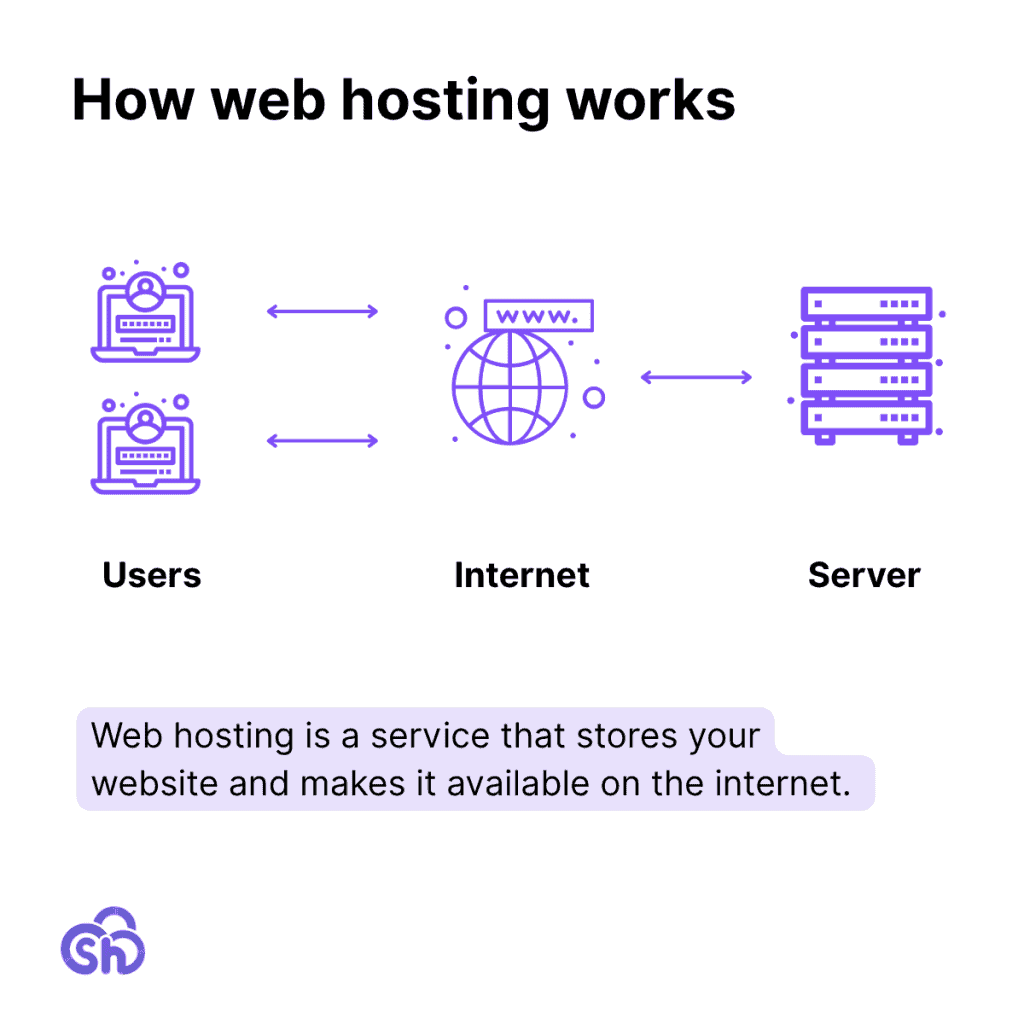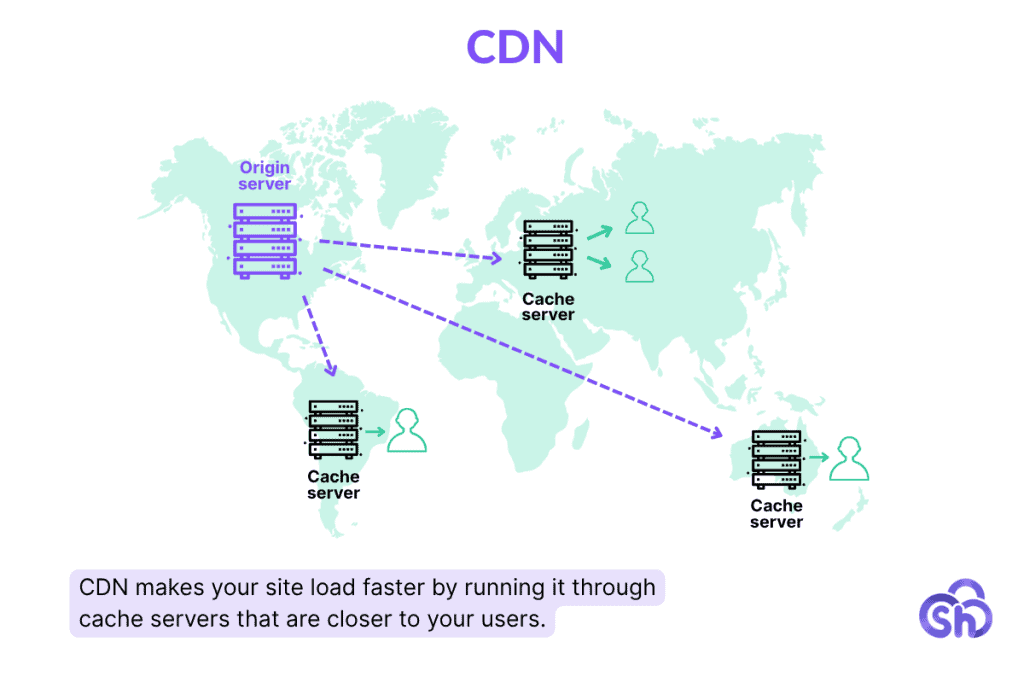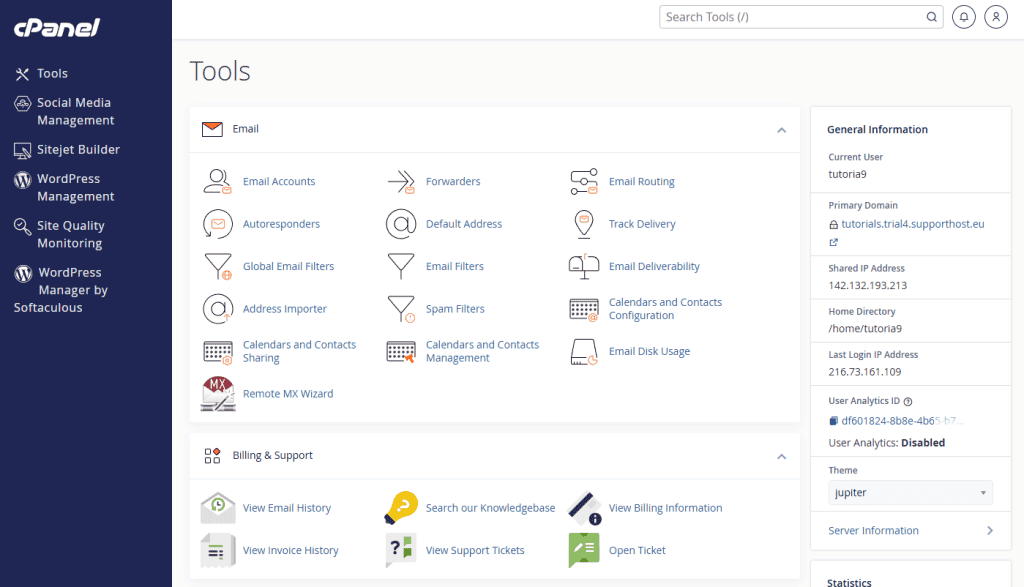If you’re building a website, one of the first big choices you’ll face is where to host it. You can use a hosting provider or run your own server. Both options work, but they’re very different in how much control, cost, and effort they require.
In this guide, we’ll explain the difference between web hosting vs. housing (also called “in-house infrastructure”) so you can decide what’s best for your website.
What is Web Hosting?
Web hosting is a service that stores your website and makes it available on the internet. Every website you visit lives on a computer called a server. A hosting company owns and manages these servers so you don’t have to.
When you sign up for hosting, you rent space on one of these servers. That’s where your website files go, like your homepage, pictures, blog posts, and anything else you upload. When someone types your domain name into their browser, your web host sends the right files to their browser so your site loads.

Most people use web hosting because it’s simple. You don’t need to buy equipment or know how to manage servers. Your host takes care of things like:
- Keeping your site online 24/7.
- Protecting your site from attacks.
- Backing up your files.
- Helping if something breaks.
- Managing email, databases, and other features.
There are different types of hosting, like shared hosting, dedicated servers, and cloud hosting. You can start small and upgrade later. At SupportHost, we help you pick what works best for your needs and we’re here if you ever need help.
What is Housing (In-House Infrastructure)?
In-house infrastructure means running your own web server instead of using a hosting company or other third-party vendor. You buy the server, install it (usually in your office or home), and set everything up yourself. You’re in charge of the hardware, the software, and keeping the system running. That includes:
- Installing the operating system.
- Setting up the website software.
- Managing updates and patches.
- Making backups.
- Fixing problems when they come up.
- Keeping it secure from hackers or viruses.
- Paying for power and internet.
This is a lot of work and can get expensive fast. You need technical knowledge or someone on your team who knows how to handle it. You also need to be available in case something breaks, especially if your website needs to be online all the time.
Some large businesses use in-house servers because they want full control or have special security or compliance needs. But for most people, it’s much easier and safer to go with a hosting company because you save time and avoid headaches.
Key Differences of Web Hosting vs. Housing
Now that you know what each one is, let’s break down how web hosting vs. housing are different. These key areas matter most when deciding how to host your website.
Infrastructure
Web hosting: The hosting company provides the setup. They own the servers, storage, and network gear. You don’t have to deal with any of it. You just use their space and tools to run your site. This is the biggest difference between web hosting vs. housing.
Housing: You’re in charge of everything. You buy the server, hook it up, and keep it running. You need a reliable internet connection, backup power, and a safe place to store your hardware. It takes more time, more money, and more technical skill.
Performance
Web hosting: Web hosts usually offer faster speeds right out of the box. They use optimized servers, fast storage, and data centers built to handle lots of traffic. Many also have tools like content delivery networks (CDNs) that make your site load fast by running it through edge servers closer to your users.

Housing: Performance depends on what you build. If you use top-tier hardware and maintain it well, it can be fast. But it’s easy to fall behind. If something slows down your server (like a power issue or outdated parts), your site slows down too.
Security
Web hosting: Web hosting providers take care of security for you. They block attacks, keep software up to date, and monitor their servers 24/7. You still need to use strong passwords and update your plugins, but the big stuff is covered.
Housing: Website security is your responsibility. You must set up firewalls yourself and scan for threats. Backups are your responsibility too. If someone hacks your server or your data gets wiped, it’s up to you to fix it.
Uptime/Reliability
Web hosting: Hosting companies work hard to keep websites online. They have backup power, fast internet, and teams that fix problems right away. Most hosts promise 99.9% uptime or better, which means your site is almost always available.
Housing: Your server depends on your own setup. If the power goes out or your internet drops, your site goes offline. You need backup systems in place to avoid downtime, which can be hard and expensive to manage.
Maintenance
Web hosting: Your hosting provider handles most of the technical stuff. They take care of server updates, hardware checks, and backups. You still need to maintain your website content, but the server side is mostly hands-off.
Housing: You’re responsible for everything. That includes hardware repairs, software updates, and system backups. Sure, you have total control, but if your hard drive fails or an update breaks something, you have to fix it yourself.
Management
Web hosting: Managing your site is easy. You get a control panel where you can install apps, check traffic, and manage settings. Most hosts also offer support if you get stuck.

Housing: You need to manage every part of the system. That includes the server setup, user access, software installs, monitoring tools, and more. It takes time, and you need to know what you’re doing.
Cost
Web hosting: Hosting plans are affordable and predictable. You pay a monthly or yearly fee based on the features you need. The provider covers server costs, power, cooling, and maintenance. No surprise expenses. The price of a dedicated server starts at just Out of stock€ per month.
Housing: Running your own server costs more upfront. You need to buy hardware, pay for electricity and internet, and replace parts over time, none of which gets subsidized by other sites (because there aren’t any). You may also need to hire IT help. Costs can add up fast, especially if something breaks.
Scalability/Flexibility
Web hosting: It’s easy to grow. You can upgrade your plan or switch to a bigger server with just a few clicks. Sometimes upgrades happen automatically depending on your site size or traffic load. Most hosts also let you scale down if you need less. You only pay for what you use.
Housing: Scaling is harder. You need to buy and install more equipment. That takes time, money, and planning. If traffic spikes or your needs change quickly, you might not be able to keep up.
Compliance
Web hosting: Many hosts follow common rules for data protection and security. Some even offer special hosting for industries like healthcare or finance. But you still need to make sure the host meets your specific legal needs.
Housing: You have full control over how data is stored and protected. That can help with strict rules or internal policies. But it also means you’re fully responsible for meeting all compliance requirements.
Environmental Impact
Web hosting: Many hosting providers use energy-efficient data centers and green technology (sometimes called “green hosting”). Some even use renewable energy or offset their carbon footprint in other ways. Their business is often more eco-friendly because servers are shared and optimized.
Housing: Running your own server can use more power, especially if it runs 24/7 in a home or office. You need to cool the hardware and keep it online all the time. That usually means higher energy use and more waste over time.
Disaster Recovery
Web hosting: Most hosts have backup systems in place. This means if something fails, your site can be restored quickly from a backup. Many providers offer daily or automatic backups.
Housing: You must set up your own backup and recovery plans. That includes copying your data, storing it somewhere safe, and having a plan if something goes wrong. If your server crashes or data is lost, recovery can take longer if it’s even possible.
Learn more about site recovery in our complete guide on WordPress backups.
Web Hosting vs. Housing Comparison
Now that you know the differences betweeen web hosting vs. housing, here’s a quick guide to help you decide which option fits your needs. Below are common situations where each choice makes the most sense.
When to Choose Web Hosting
Web hosting is a better choice if you:
- Want a simple setup with no server management.
- Don’t have technical experience.
- Need your site up and running quickly.
- Prefer fixed, predictable pricing.
- Want automatic backups and security included.
- Are building a blog, small business site, portfolio, or online store.
- Need support from a hosting provider when things go wrong.
- Expect normal traffic levels or seasonal growth.
- Don’t want to deal with hardware or maintenance.
When to Choose Housing
Running your own server might make sense if you:
- Already have IT skills or a dedicated tech team.
- Need full control over hardware, software, and data.
- Must follow strict rules or compliance requirements.
- Have very specific performance or configuration needs.
- Want to keep sensitive data in-house.
- Are building custom apps that need full backend access.
- Have the budget to invest in equipment and ongoing maintenance.
- Are prepared to handle your own backups, updates, and security.
Hybrid Approaches
Some organizations opt for a hybrid approach to web hosting vs. housing.
With hybrid hosting, part of your website or app runs on a hosting provider’s server, and part runs on your own hardware. You might use web hosting for the public parts of your site (like your homepage, blog, or store) and keep private tools or databases on your in-house server. This setup lets you balance convenience and control.
There are good reasons to go hybrid:
- You want the speed and support of web hosting, but you also need to follow strict rules about storing customer data.
- You already own a server and want to get more use out of it, but without hosting your whole site on it.
- You need to test something locally before going live.
A hybrid setup gives you flexibility, but it also adds a lot of complexity. You’ll need to make sure both parts work well together. That includes managing data connections, keeping everything secure, and making backups in both places. If something goes wrong, it can be harder to figure out where the issue is.
Still, if you have special needs or want more control without doing everything yourself, a hybrid approach might be worth it. Just be ready to plan ahead and get help when needed.
Web Hosting vs. Housing for Your Business
Choosing between web hosting vs. housing depends on what your business needs. Think about the size of your website, your budget, your team’s technical skills, and how much you plan to grow. If you want to keep things simple, web hosting is a great place to start. If you need more control and have the right setup, housing could work too.
That said, web hosting is right for most businesses throughout the life of their organization. Very few organizations use in-house infrastructure and none of them start that way.
Nevertheless, look at what works best for you now, but also think about what will work a year from now. A smart choice about web hosting vs. housing today can save you time, money, and stress later.
Ready to build your WordPress site?
Try our service free for 14 days. No obligation, no credit card required.



